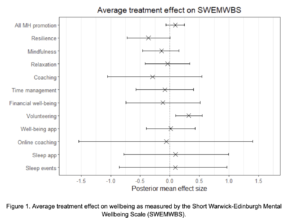Mental health interventions at work: evidence from Britain’s Healthiest Workplace survey.
Nancy Hey, The Centre’s Executive Director writes…
When it comes to mental wellbeing initiatives in the workplace, we need to get much smarter about what works, for whom, to what extent, in what context, how and for how much. This is something that organisations like the Wellcome Trust are pioneering with their commission into workplace mental health.
In their report, the Wellcome Trust highlights the lack of causal evidence into specific mental health interventions in the workplace. Our blog this week highlights a piece of research that aims to address this – with findings that run counter to the narrative that several initiatives can help improve mental health. We welcome this interesting contribution to the debate – and agree that more research like this is needed.
Beyond individual courses or initiatives, we do know that there are many other aspects of work that can affect our wellbeing, for example the people we work with, or the responsibilities we are given, which come under the umbrella term job quality.
Our relationships at work – with our peers, customers and manager – are one of the top drivers of job satisfaction, meaning that supporting positive social connections and a sense of belonging at work is key. So the finding in this piece of research of the positive impact of volunteering on workplace mental health is promising – the next step is bigger, better trials, and systematic reviews with high methodological rigour.
Read more on how to maximise wellbeing from volunteering in our review. Good examples of professional volunteering include programmes run by THET and Pro Bono Economics.
William Fleming, a Sociology PhD student at University of Cambridge summarises his thesis, drawing on robust quantitative methods, about the health and wellbeing effects of ‘wellness’ programmes in British workplaces.
Britain’s Healthiest Workplace survey has been conducted by the policy think tank RAND Europe for more than five years and covers hundreds of employers and tens of thousands of employees in the UK. It is the only survey in the country to focus specifically on health and wellbeing at work and its multi-level questionnaire allows a unique insight into both employee and management perspectives.
My investigation began by estimating the probability of participation in a mental health promotion programme, through an extensive list of predictors such as gender, job level, long term health and job characteristics which are known to affect both participation and mental health. From there, I matched each participant with a partner from the same organisation who didn’t participate, the key characteristics so that the only difference between the two groups is participation. From here, a so-called ‘treatment effect’ could be calculated. It is generally difficult to draw any causal inference from cross-sectional studies and non random samples like Britain’s Healthiest Workplace survey, but Propensity Score Analysis works as a ‘synthetic’ control trial, allowing us to get closer to causality.
The programmes tested were common types such as resilience training, mindfulness, relaxation courses and time management initiatives. As seen in the Figure below, I found no average treatment effect across the majority of these short-term programmes and multiple long-standing mental health outcomes. Importantly though, the results don’t discount positive benefits, but they also highlight that there can be negative effects to balance this out.

The notable exception in these results is volunteering opportunities. There is existing evidence for the positive impacts of charitable volunteering and these results suggest that perhaps we are taking the wrong approach. Should we be considering wellbeing on a more social level – as a collective good not something to purely be measured through an individual?
While attempts by organisations to improve worker wellbeing are not a waste of time, a few ‘off-the-shelf’ wellbeing initiatives are not going to solve long-standing problems of stress and burnout in the workplace.
Instead, it is important to look at the evidence which shows that job quality and its characteristics are proven drivers of wellbeing at work and organisational goals should be shaped around what we know is important to employees. Ultimately improving employee wellbeing is about understanding the wellbeing issues in your workplace and addressing these using what works.
Use our survey to understand the wellbeing of your employees, then compare them against these benchmarks
Further evidence for improving mental health and wellbeing:
- At work
- In schools
- For further & higher education students
- Using psychological interventions
Coming up this year is our work on measuring mental wellbeing using the popular WEMWEBS scale. We’ll be calling for your evaluations using this measure soon…
What works for supporting employee mental health?
Watch the Business Leaders' Council webinar
